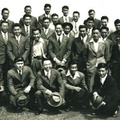February 19, 1942—a day that should live in infamy. It was the day that United States President Franklin D. Roosevelt signed Executive Order #9066 allowing military authorities to EXCLUDE anyone from anywhere without trial or hearings. It led to the removal of all Japanese Americans, citizens and aliens alike, from the West Coast and into concentration camps in the interior of our country. We lost our businesses, our possessions, our homes, our friends and neighbors. However, it was not the material losses or the physical deprivation that was so devastating. It was instead the humiliation that was the most demoralizing and had the most lasting effect.
I was nineteen years old and attending junior college as an art major. I had no interest in social or political issues. I had learned to accept racial prejudice and unfair discrimination as a matter of course, something we could do nothing about and must learn to live with. I was taught not to make waves.
We were first sent to an “assembly center” at the Pomona Fairgrounds in Los Angeles County. Later we were shipped by train to the badlands of Wyoming. They called the “relocation center” there Heart Mountain. The mountain was there, but the heart would be forever elusive. There were over ten thousand Japanese faces in this concentration camp and we knew there were over a hundred thousand more in nine other similar camps scattered within the bowels of America—Land of the Free. Our world had shrunk to the one-mile-square confines of a barbed wire fence. Our family name was replaced with a family number. Something was seriously amiss.
Then there came the final blow. While still confined with our civil rights suspended, we were required to serve military duty in a racially segregated combat unit—this occurring while our parents were held as hostages in the concentration camps to ensure our military performance overseas. It was hailed by some in our community as a wonderful opportunity to prove our loyalty. The issue of constitutional abuses had been reduced to a question of my loyalty?! It clearly was time for me to set my sketchpad aside and face reality.
* * *
The Heart Mountain 63 bears the distinction as the only organized draft-resistance group of all the ten War Relocation Center (WRA)-administered camps. This is largely attributable to the preexistence of the Fair Play Committee (the FPC), a group formed a year earlier in 1943 as a forum to address civil rights issues resulting from our unwarranted abduction and detention.
My initial purpose in attending the FPC meeting was to elicit information about the moral and legal justification for our continued detention without hearings or trial. I was also seeking what recourse we might have when, while still under such duress, we are ordered to fulfill the same military obligations as citizens enjoying the freedoms denied us. It was after our keepers, the WRA, would provide no answers and would only remind us of the dire consequences of disobeying government orders that we, as a group, voted to individually ignore the notices to report for pre-induction exams in order to contest the issue in a court-of-law. I don’t know how many members decided to comply with the orders, rather than risk a term in prison, but sixty-three, including myself, did resist, and thus we had our test case.
The pro-administration and pro-Japanese American Citizens League (JACL) camp newspaper, the Heart Mountain Sentinel, was especially vicious in its editorial attacks, accusing the FPC leaders of treason against our country and betraying our people. It characterized the members (me) as “deluded, dim-witted cowards,” allowing ourselves to be manipulated by the “the trouble-making leaders.” They scoffed at any suggestion that we were exercising our rights of dissent under the protection of the US Constitution.
While awaiting trial in the Cheyenne county jail, six of us, apparently selected at random, were notified we had two visitors who wished to interview us. This was odd, I thought, as we were previously denied visitations from our families and friends by order of the prosecuting attorney. Why then were these strangers given access to us for an interview without the presence of our attorney?
I was led to a small room where I sat alone for over an hour. Finally a guard came and led me to yet another room, bare except for a long table at which sat two men in suits and ties on one side and an empty chair on the side nearest me. I sat down while the two introduced themselves as Joe Grant Masaoka and Min Yasui, both names familiar to me as prominent JACL leaders. I didn’t introduce myself as they already had my whole twenty-year history, and that of my family, in front of them. I then realized this was not just about me and it was not a friendly interview; rather, it was an interrogation.
After a half-hearted attempt to advise me of the futility of my naïve expectations, they questioned me about what influence the Fair Play Committee had in my decision to oppose the draft. They wanted specifics—names and statements. I suggested that the JACL surely had spies at every FPC meeting. Why did they need me to confirm what they already knew? Could it be they were proposing a plea bargain in exchange for my testimony in the upcoming trial of the FPC leaders?
When it became obvious I would not join them in their game of junior G-men for the government, they abruptly ended the session by proclaiming I was headed for prison and would be shunned by my community for years to come. They would personally see to that.
On the very first day of our trial, Judge T. Blake Kennedy addressed the sixty-three of us as “You Jap boys.” We all looked at each other in disbelief and were too startled to utter any “Boos!” We knew then that things would not go well for us. It was apparent that Judge Kennedy, a self-professed racist, would be happy to rid his great State of Wyoming of this scourge the federal government had foisted on them, by catapulting us into the prisons of some other state, perhaps somewhere back to the West Coast.
Prosecuting Attorney Carl Sackett cleverly maneuvered the proceedings into the narrow issue of: “Did we, or did we not, knowingly and deliberately, disregard the pre-induction notices for a physical exam?” Of course we did! How else could we publicize our predicament and the un-constitutional imprisonment of our people? Defense Counsel Samuel Menin persistently questioned the applicability of the Selective Service Law, due to our prior state of incarceration. He failed, however, to cite the specific provision in the Selective Service Act of 1940, which would have substantiated his claims. In its section on CLASSIFICATION, paragraph 346, it states: “Class IV-F: (a) in class IV-F shall be placed any registrant who: (and under item #5) is being detained in the custody of any criminal jurisdiction or OTHER CIVIL AUTHORITY.” We were, in fact, being detained by the War Relocation Authority, a civil authority. It would seem the draft board was in violation of the classification procedures in every instance where an internee was classified 1-A (eligible for conscription) instead of IV-F (ineligible for conscription). But, if Samuel Menin slipped-up on this key piece of evidence, so did the other lawyers defending the several internee draft cases of other camps, since they apparently neglected to research the provisions of the very law they presumed to challenge.
At any rate, those inducted into the armed forces from the camps were not draftees; it seems they had unwittingly volunteered! This revelation would be especially tragic for those who were inducted reluctantly—and never returned. Perhaps the many monuments memorializing those killed in action have a much more heart-rending story to tell than Japanese America, especially those within it who promoted military service as a form of ethnic redemption, would care to admit.
Due to time constraints, I will spare you further examples of a judicial proceeding hopelessly entangled in its own ignorance and arrogance. At one point, even the American flag seemed to lose its color and shed a few tears.
Not surprisingly, we were found guilty and were sentenced to three years in prison. In spite of our convictions, a second group of twenty-two draft resisters from Heart Mountain followed in our footsteps. They had no hopes of winning, of course, but acted on principle and as a symbolic gesture of unity in defiance of Judge Kennedy’s court as an insult to the US Constitution.
* * *
A few weeks later, seven leaders of the Fair Play Committee were indicted in the very same courtroom. Surprisingly, an eighth person was included in the indictments: James Omura, the former English section editor of the Rocky Shimpo newspaper in Denver, Colorado. He had never set foot in any of the “relocation” camps and had never met any of the resisters or FPC leaders, but during his editorship in early 1944 had supported, in principle, our protest in his editorials. Omura had been a harsh critic of the JACL and staunch, if solitary, defender of Japanese American civil rights from the inception when the threat of our removal and detention first arose. He was the lone voice expressing outrage at the February 1942 Tolan Committee Hearings, opposing the JACL stance of unconditional cooperation as a preemption of citizens rights and therefore constitutionally questionable. Queried Omura: “Has the Gestapo come to America?” This question was never answered, but his asking it would earn him the unabated venom of the JACL for the rest of his life. He was exonerated of all charges under the statute of freedom of the press, but his journalistic career was destroyed by the continued harassment of the JACL. The other seven FPC leaders were convicted, but their convictions were later reversed by an appellate court.
* * *
So what?? These events happened over sixty years ago and we must be getting pretty weary of hearing all the self-serving sob stories, mine included. The US Constitution is under fire today as it was in 1942. And as in 1942, no one seems to be doing anything about it. All our WWII stories seem to be about the US Constitution failing to protect our rights as citizens. Yet, how many of us stepped forward to defend the Constitution in its hour of need?
Oddly enough, the sole exception TODAY is a JAPANESE AMERICAN: First Lieutenant Ehren Watada is sacrificing his substantial military standing by following his conscience and refusing participation in a war he believes is constitutionally and morally corrupt! Where does Japanese America stand? After our experience in WWII, are we still naïve enough to believe our government can do no wrong? Does Japanese America still feel an overwhelming need to “PROVE OUR LOYALTY”?
And yes. Jimmie, the Gestapo HAS come to America! If we are to learn anything from the horrendous experience of our people during WWII, it is that of the fundamental responsibility of every citizen to protect our US Constitution through the EXERCISE of the basic humanitarian tenets our country was founded on. We may pledge our allegiance to constitutional principles, but it is only through our ACTIONS that we can fulfill that pledge and TRANSFORM our IDEALS into our REALITY! This is not about leadership or heroism. It is about plain, ordinary citizens like you and I—even if I happen to be a “dim-witted Jap boy!” And we must ASSERT our dedication to democratic principles, not in SPITE of Executive Order 9066 and the Patriot Act, BUT BECAUSE of them!
*Yosh Kuromiya image credit: Irene Kuromiya
** A Heart Mountain resister, Yosh Kuromiya will be speaking in a panel called "Stories of Resistance: Consciousness, Conscience, and the Constitution" at the Whose America? Who’s American? Diversity, Civil Liberties, and Social Justice Enduring Communities National Conference in Denver, CO on July 5, 2008. Enduring Communities is a project of the Japanese American National Museum.
© 2008 Yosh Kuromiya





